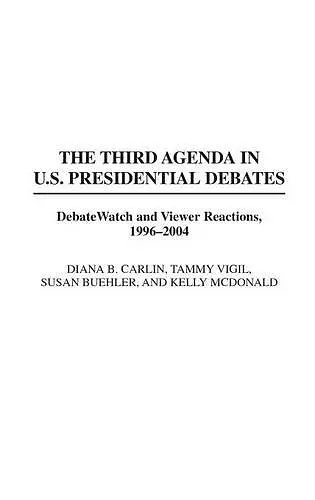The Third Agenda in U.S. Presidential Debates
DebateWatch and Viewer Reactions, 1996-2004
Susan Buehler author Diana B Carlin author Kelly McDonald author Tammy Vigil author
Format:Hardback
Publisher:Bloomsbury Publishing PLC
Published:30th Nov '08
Currently unavailable, and unfortunately no date known when it will be back

"The Third Agenda offers an important look at how citizens process the information that the quadrennial presidential and vice presidential debates offer. It points to important differences between academic or media assessment and that of citizens without pushing a set of conclusions as the conclusions. The book lets the citizens speak while offering observations that help guide those in the academy to grasp how the debates may or may not be succeeding in reaching their true goals-informing, persuading, and energizing voters." -- Theodore F. Sheckels, Professor of English & Communication, Randolph-Macon College
Drawing on scholarly research and media critiques, The Third Agenda in Presidential Debates examines the most recent U.S. presidential debates from the perspective of television viewers who watched the encounters first hand.
Drawing on scholarly research and media critiques, The Third Agenda in Presidential Debates examines the most recent U.S. presidential debates from the perspective of television viewers who watched the encounters first hand. Through a national program—DebateWatch—tens of thousands of viewers had an opportunity to provide feedback to the debate sponsors, the campaigns, and the media following the 1996, 2000, and 2004 presidential debates. As a result, thousands of groups met after each debate to discuss what they liked and didn't like about a particular candidate, what they learned, and what they still needed to know about the issues presented before them. These focus groups, along with various surveys and emails, allowed viewers to lay out a concise third agenda for the debates: the public's, one in which comparisons could be drawn between their own interests and that of the media and the candidates themselves.
Besides clearly mapping out the important aspects the public looks for when watching a debate, the authors demonstrate how citizen participation challenges candidates and their issues. In addition, the authors offer predictions for future debates and how new generations will choose to participate.
Along with 14 analytical chapters, this work contains four detailed appendices, several tables, and an index.
"It offers new data and a perspective (qualitative) on presidential debates that differs from most work in this area. . . . There is no question that this book offers a unique and important contribution to the literature. It merits a place in libraries and on scholars' bookshelves." - Political Science Quarterly
ISBN: 9780275967734
Dimensions: unknown
Weight: unknown
296 pages